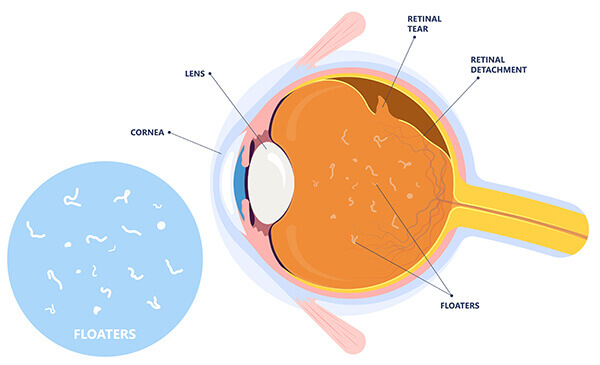Floaters

At Kresloff Eye Associates, our team of experienced eye doctors and specialists is equipped to assess, diagnose, and treat various eye conditions, including floaters, to ensure the best outcome for the health of your eyes. We are dedicated to educating our patients on these conditions and offering personalized treatment options to promote optimal eye health.
What Are Floaters?
Floaters are specks, squiggly lines, or dots that appear to float across your vision. For some people, they are most noticeable when they are looking at a bright background like a blue sky or a white piece of paper.
Many people describe floaters as appearing to be like cobwebs, tiny bugs, or hair strands floating in the air. However, floaters are actually tiny clumps of cells that float in the vitreous humor, which is the clear gel-like substance that fills the inside of your eye.
Vitreous humor is a substance that helps maintain the shape of your eye and allows light to pass through to the retina. As you age, the vitreous humor may shrink or thicken, and these changes can cause small clumps of cells or other debris to become more noticeable as they float around in the vitreous humor.
While floaters are usually harmless, they can be annoying. Sometimes, they can signal a more serious eye problem, especially if you suddenly experience many new floaters or flashes of light in your vision.
It is essential to visit your eye doctor if you experience any sudden changes in your vision or if you are concerned about your floaters.
Are Floaters a Sign of a Serious Eye Condition?
Floaters are a common visual complaint and are often a natural part of aging. However, in some cases, floaters can indicate a serious eye condition.
One serious condition that floaters can be associated with is a retinal tear or detachment. The sudden onset of floaters, particularly if accompanied by flashes of light or a shadow in the peripheral vision, can be indicative of a tear or detachment in the retina.
Retinal tears and detachments require immediate medical attention as they can lead to permanent vision loss if left untreated. Another condition that can cause floaters is vitreous hemorrhage, which occurs when blood vessels in the vitreous humor leak blood.
A vitreous hemorrhage can cause a sudden increase in floaters and may also be accompanied by blurry or decreased vision. Vitreous hemorrhage can be caused by several conditions, including diabetic retinopathy, macular degeneration, and trauma to the eye.
Other serious eye conditions that can cause floaters include uveitis, which is inflammation of the eye’s middle layer, and posterior vitreous detachment, which occurs when the vitreous humor pulls away from the retina. Both of these conditions often require medical attention to prevent further damage to the eye.
While floaters are often harmless and may not be a cause for concern, sudden onset or an increase in floaters accompanied by other symptoms can indicate a serious eye condition. For this reason, if you notice any sudden changes in your vision, new flashes, or an influx of new floaters, it is important to see your eye doctor at Kresloff Eye Associates immediately to prevent irreversible damage to the eye.
Can Floaters Go Away On Their Own?
Floaters can fade, disappear or resolve on their own over time. If they don’t fade, most of the time, the brain will adapt and learn to ignore these visual disturbances and will begin to not bother you as much anymore at some point.
This process can take a few weeks to months, and in some cases, floaters may not completely disappear. While floaters can be a normal part of the aging process and are usually harmless, they can be annoying and affect daily activities such as reading or driving.
For some people, the presence of floaters can cause them to worry about their eye health. It’s important to remember that regular eye exams can help detect any underlying eye conditions and ensure that your eyes are healthy.
Your eye doctor can also provide advice on managing floaters and help determine if any further treatment is necessary.
Who is At-Risk For Developing Floaters?
Floaters are a common condition that affects the eyes, and they can occur in anyone, regardless of age or gender. However, certain factors may increase your risk of developing floaters.
The risk of developing floaters tends to increase with age. Older individuals are more likely to experience changes in the vitreous, the gel-like substance that fills the inside of the eye and helps maintain its shape.
These changes can cause the formation of floaters. People with certain medical conditions, like diabetes and high blood pressure, may also be at higher risk of developing floaters.
Those who are nearsighted often have an eye shape that is longer than usual. If you are nearsighted, this refractive error may increase your risk for posterior vitreous detachment and make you more likely to develop floaters.
Additionally, those who have had eye surgery or eye trauma may be more likely to experience floaters. Finally, some lifestyle factors may also increase the risk of developing floaters.
For example, people who smoke or are exposed to high levels of air pollution may be more likely to experience eye problems, including floaters. Since floaters are relatively common, it’s expected that you will experience them at some point in your life.
If and when you do, schedule an appointment with your eye doctor at Kresloff Eye Associates to ensure that you are not at risk for vision loss. Since floaters can signify a serious eye or retinal condition, it’s important for you to not delay seeking diagnosis and treatment for new flashes or floaters.
Are you experiencing new floaters? Schedule an appointment at Kresloff Eye Associates in Collingswood, NJ, today!
